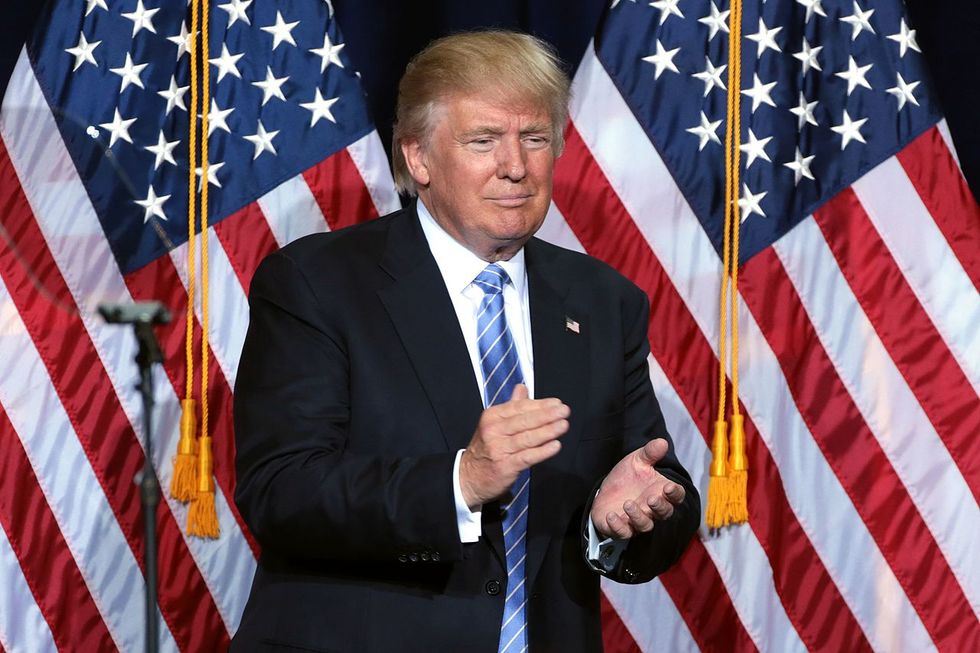It has been over two years since then-reality-star Donald Trump glided down an escalator, corn husk head of hair and all, took to the podium, and announced not only that he was running for President, but that he would "Make America Great Again."
In the time that has followed, politics –– a topic that is universally known as one of the few things to never bring up at the dinner table or with strangers –– has seemingly only become more rancorous and toxic a topic of discussion. Aided by the bevy of insults launched at political opponents, (eventual) political allies, disabled journalists, and Gold Star families alike by now-President Donald Trump, politics became more personal and tested personal relationships marred by ideological differences.
During and after the election, there were articles written about married couples splitting up over their political differences and parent-child relationships being severed, too. Now, almost a year after the election, our collective inability to separate the politics from the person is still dangerously high, especially in liberal circles.
A recent Pew Research Poll –– their Political Typology report published on October 24 –– found that fully 55% of "Solid Liberals" responded that a friend supporting Trump would "put a strain on their friendship." That is so disappointing and disheartening to me.
I would most certainly fall well within the "solidly liberal" tier or, if we're being honest, somewhere further left than that. But I also have many casual acquaintances as well as some close friends who are staunch supporters of Trump and much of his agenda, and I have never considered this to be a hindrance to our relationships.
I find many of my friends' views extremely objectionable and, in some cases, unfathomable. I have wondered how they arrived at these views and how they continue to support a man and President like Donald Trump, but I have never wondered if these beliefs that I find so objectionable should mean we cannot remain friends.
The idea that all of Trump's supporters are irredeemable, virulent racists who hate women, immigrants, and poor people, too is just a false and immoral oversimplification. There are certainly Trump supporters who fit one, if not all, of these characteristics, but there are also plenty who are genuinely good human beings with good morals and good intentions.
I must acknowledge that part of my ability to see people for more than their political views comes from my place of privilege. As a straight, white male from an upper-middle class family, I largely do not have to worry myself about the real-life implications of President Trump's agenda within the narrow context of my own life.
However, I do not think that there is anything to gain from refusing to look at people as nothing more than their respective Presidential ballots. There are a wide variety of reasons people voted for this President –– and 46% of voters did vote for him –– and, though they ultimately all led people to the same (in my opinion, wrong) conclusion, intentions do matter.
I am not prepared to write tens of millions of Americans off as incapable of being my friend simply because they made what I perceive to be a demonstrably and undoubtedly wrong decision on their ballots last November. I am equally unprepared to write off the millions of Americans who still support the President, despite what I see of him failing as a leader and a unifier.
I would hope that all Americans, regardless of political leaning, can see beyond politics and share in empathy and love for everyone, even if you find some of their beliefs extremely objectionable.







 StableDiffusion
StableDiffusion StableDiffusion
StableDiffusion 10. Extra BlanketsJuwenin Home 100% Cotton Knitted Throw Blanket
10. Extra BlanketsJuwenin Home 100% Cotton Knitted Throw Blanket StableDiffusion
StableDiffusion StableDiffusion
StableDiffusion File:Kishlaru familie.jpg - Wikimedia Commons
File:Kishlaru familie.jpg - Wikimedia Commons Photo by Hanna Balan on Unsplash
Photo by Hanna Balan on Unsplash StableDiffusion
StableDiffusion black blue and yellow round illustrationPhoto by
black blue and yellow round illustrationPhoto by 

 woman holding glass jar
Photo by
woman holding glass jar
Photo by 









